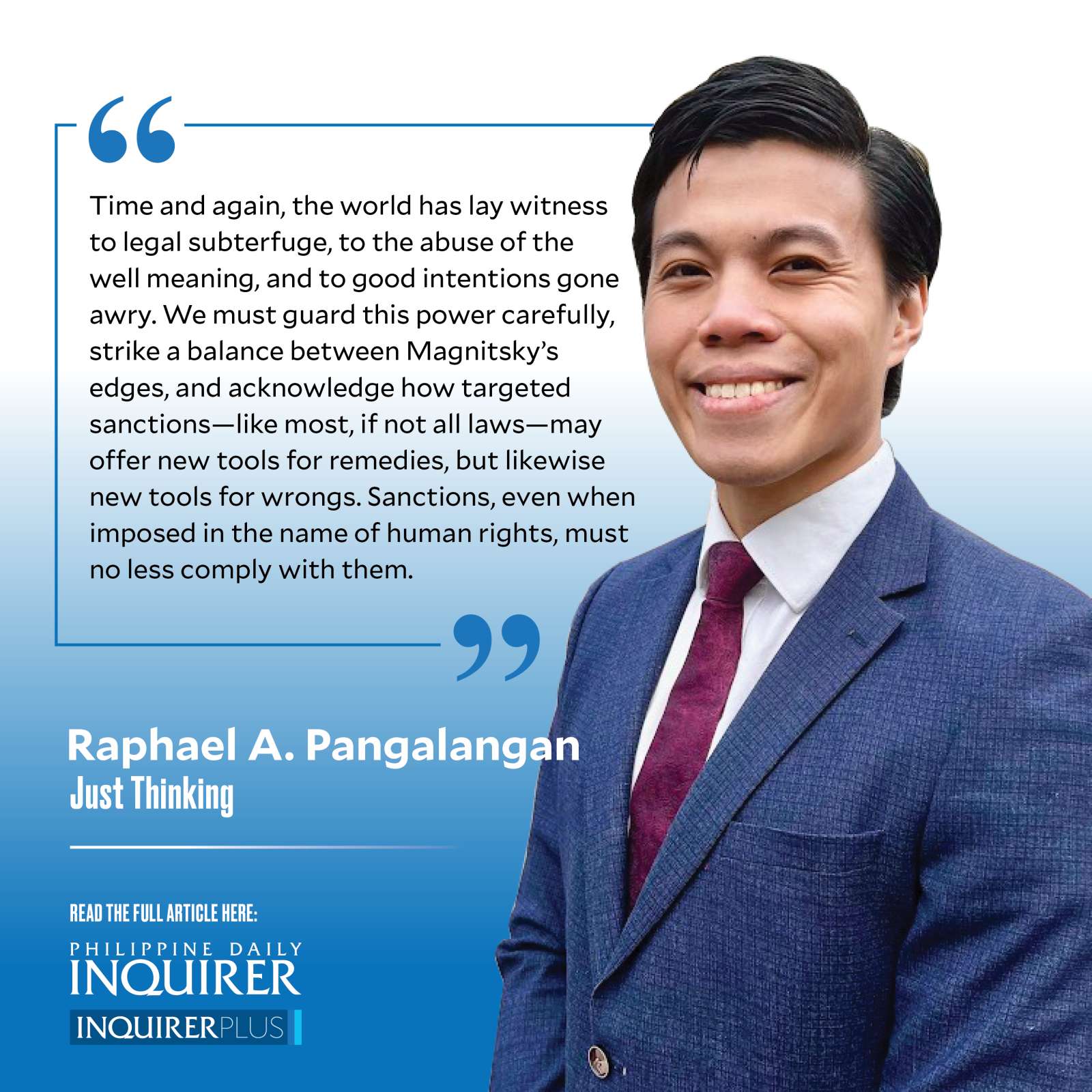Between Magnitsky’s edges

Scripture tells us: There is no authority except from God granted by His sanction. I wonder how the “Kingdom citizens” of the Kingdom of Jesus Christ (KJC) might interpret that passage when, just last week, the self-proclaimed “appointed son of God” was not sanction’s source but its object.
On Dec. 9, 2022—befittingly, International Anti-Corruption Day and, elsewhere across the international date line, Human Rights Day of Dec. 10, 2022—the US Department of the Treasury’s Office of Foreign Assets Control (Ofac) sanctioned KJC founder Apollo Carreon Quiboloy for serious human rights abuses.
At this point, you might catch yourself scratching your head asking: What on earth is a sanction? Rest assured, you are not alone. Indeed, the word “sanction,” not only in its doctrinal but definitional sense, begs explication.
Likewise described as a “Janus word,” “auto-antonym,” or “contronym,” i.e., a portmanteau of the Latin words “contra-” (contrary) and “-onym” (name), the word sanction evokes contradictory or reverse meanings depending on the context. In Romans 14:22, the biblical passage cited earlier, sanction is used to refer to an official approval for an action. But to the Ofac, a sanction is a kind of punishment for disobeying a law, in this case, international human rights law.
A “sanction,” therefore, takes many a different meaning. But in law, it also takes many a different form. So take out your notebooks and whip out your pens as we step back into the classroom to explore these finer nuances.
First things first: A sanction may be categorized depending on who is doing the sanctioning (i.e., the “sending” party). Broadly speaking, we can think of it this way: When a sanction is imposed by or pursuant to an international body/authority (e.g., the United Nations), it is referred to as an “international sanction.” This is in contrast to a “unilateral sanction,” which is imposed by a sovereign state without the sanction (in its positive, consensual sense) of international law.
Next, legal sanctions may also be categorized not only depending on who is doing the sanctioning but who or what is being sanctioned (i.e., the “receiving” party). The Ofac, for example, imposes sanctions in two ways: through using “comprehensive sanctions” to target entire countries, and “noncomprehensive” or “selective” sanctions to target specific individuals and entities. By reason of the specificity of this latter type of sanction, it is also most commonly referred to as a “targeted sanction.”
The sanctions imposed on Quiboloy were made pursuant to the US Magnitsky Sanctions regime, which authorizes the President of the United States to unilaterally impose sanctions directly on certain “foreign persons”—natural and juridical alike—for serious human rights abuses. So, to those who have been following, this would be categorized as—you guessed it—a form of unilateral targeted sanction.Thus, in Quiboloy’s case, all of his property and interests in property in the US are thereby blocked, and US persons and entities are likewise blocked from engaging in transactions with him.
There are many other ways of mapping out the vastly uncharted territory of sanctions law and policy. Ways that this column does not purport to exhaust. But if there were one other aspect of Magnitsky sanctions we should acknowledge, it is the objection thereto.
You see, while the Magnitsky regime has been widely celebrated as a “major innovation” in human rights accountability, it must be kept in mind that the unilateral imposition of sanctions has long been censured in international legal order. As early as 1974, the UN General Assembly adopted the Charter of Economic Rights and Duties of States, which expressly prohibits the use of “economic, political, or any other type of measures to coerce another State in order to obtain from it the subordination of the exercise of its sovereign rights.”
What has been prohibited in international law has since been cast in positive light; invoking the language of international human rights to not only justify but legitimize its extant. Quiboloy’s counsel attempts to build upon that irony, and claims his client’s right to the “presumption of innocence.”
Quiboloy’s counsel is mistaken. The presumption of innocence kicks in for the purposes of criminal proceedings. But in the case of Magnitsky sanctions, what is imposed is a species of quasi-administrative liability that does not trigger the application of the presumption in the first place.
But nonetheless, the objection reveals a deeper concern. Time and again, the world lays witness to legal subterfuge, to the abuse of the well-meaning, and to good intentions gone awry. We must guard this power carefully, strike a balance between Magnitsky’s edges, and acknowledge how targeted sanctions—like most, if not all laws—may offer new tools for remedies, but likewise new tools for wrongs.
Sanctions, even when imposed in the name of human rights, must still comply with them.
——————
thinkjustly@gmail.com




















